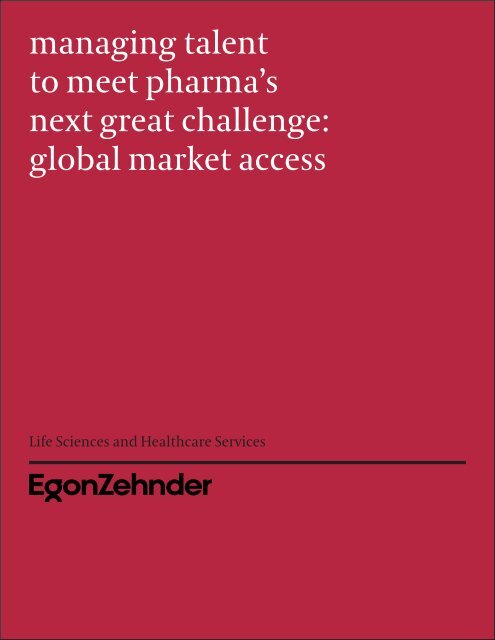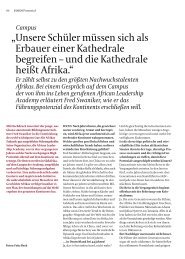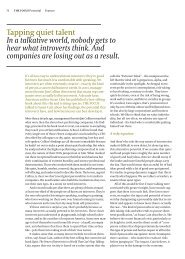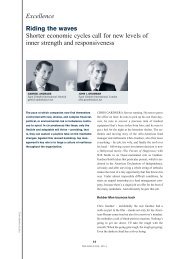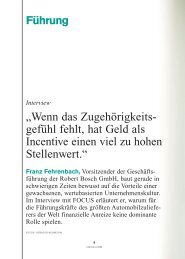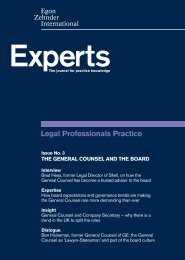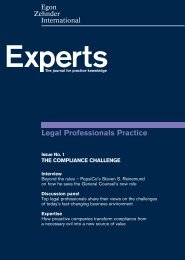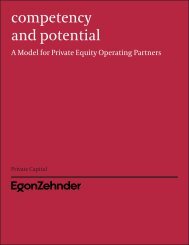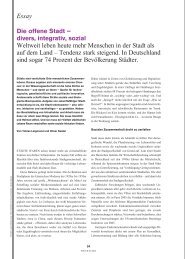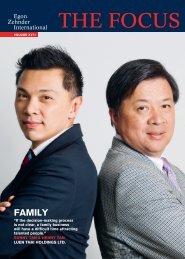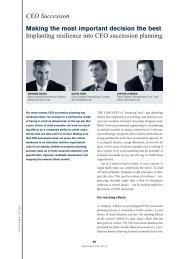managing talent to meet pharma's next great challenge: global ...
managing talent to meet pharma's next great challenge: global ...
managing talent to meet pharma's next great challenge: global ...
You also want an ePaper? Increase the reach of your titles
YUMPU automatically turns print PDFs into web optimized ePapers that Google loves.
<strong>managing</strong> <strong>talent</strong><br />
<strong>to</strong> <strong>meet</strong> pharma’s<br />
<strong>next</strong> <strong>great</strong> <strong>challenge</strong>:<br />
<strong>global</strong> market access<br />
Life Sciences and Healthcare Services
In an environment where private and government<br />
payers around the world are becoming more powerful<br />
than ever, pharma CEOs increasingly recognize the<br />
critical role “market access” plays in company success.<br />
In the past 18 months, Egon Zehnder has spoken with<br />
more than 200 <strong>global</strong> and regional market access<br />
executives <strong>to</strong> help organizations enhance their skills<br />
and <strong>talent</strong> in market access. During the course of this<br />
work, we have uncovered a range of approaches <strong>to</strong><br />
<strong>talent</strong> development and organizational structure that<br />
leading companies are using <strong>to</strong> help embed market<br />
access thinking in their strategies and operations.<br />
What is your organization doing<br />
Alyse Forcellina<br />
Egon Zehnder<br />
New York<br />
alyse.forcellina@egonzehnder.com<br />
+1 212 519 6142<br />
Can Akannac<br />
Egon Zehnder<br />
Chicago<br />
can.akannac@egonzehnder.com<br />
+1 312 260 8929
Managing Talent <strong>to</strong> Meet Pharma’s Next Great Challenge 2<br />
<strong>managing</strong> <strong>talent</strong> <strong>to</strong> <strong>meet</strong> pharma’s<br />
<strong>next</strong> <strong>great</strong> <strong>challenge</strong>: <strong>global</strong> market access<br />
In the past, if a pharmaceutical product was safe<br />
and it worked, market access was usually assured.<br />
No longer. Market access has become far more<br />
challenging due <strong>to</strong> a confluence of fac<strong>to</strong>rs: the<br />
need <strong>to</strong> contain rising costs, the proliferation of<br />
competing drugs in the same therapeutic areas, the<br />
consolidation of payers, the use of evidence-based<br />
medicine (EBM) and health technology assessments<br />
(HTAs) in payer decisions, and the establishment<br />
of new HTA institutions in many regions. Generics<br />
and biosimilars also play a role by giving payers<br />
additional choices when deciding what products<br />
they will cover.<br />
Incorporating the voice of market access is<br />
crucial for a company’s most important and<br />
costly investments, including Phase III trials, M&A<br />
activity, and resourcing for product launches.<br />
Underestimating or misjudging payers’ likely<br />
approaches <strong>to</strong> <strong>managing</strong> your products can have<br />
a price tag in the billions of dollars. Hence, the<br />
pharmaceutical industry has had <strong>to</strong> evolve its<br />
market access strategies and capabilities across<br />
a variety of functional disciplines, that <strong>to</strong>gether<br />
broadly represent “market access” (See Figure 1<br />
below.)<br />
Figure 1. Elements of Market Access<br />
Developing <strong>global</strong> pricing and reimbursement strategy<br />
(including pricing bands, launch order, etc.) for launch<br />
products, and maintaining over time<br />
Determining contracting/net price strategy<br />
(including risk sharing arrangements, discounting, etc.)<br />
Pricing &<br />
Reimbursement<br />
Developing and executing reimbursement support and<br />
patient assistance services <strong>to</strong> ensure patient access <strong>to</strong><br />
products<br />
Evidence generation, including value<br />
s<strong>to</strong>ry and value dossier development<br />
Health technology assessment analysis<br />
Health<br />
Economics &<br />
Outcomes<br />
Research<br />
(HEOR)<br />
Market<br />
Market<br />
Access<br />
Access<br />
Account<br />
Management /<br />
Managed<br />
Markets<br />
Developing strategy for government<br />
payers, health plans, physician<br />
groups, medical centers, etc.<br />
Field-based/country-specific teams<br />
that establish and maintain<br />
relationships with key payers<br />
Analyzing clinical data prospectively and<br />
retrospectively post launch <strong>to</strong> generate “real<br />
world evidence” and value for money<br />
Analytics &<br />
Real World<br />
Evidence<br />
Public /<br />
Government<br />
Affairs &<br />
Advocacy<br />
Communicating outcomes and pricing<br />
decisions with the payers and governments<br />
Forming or aligning with patient groups<br />
for effective reimbursement strategies
3 Egon Zehnder<br />
In the past 3-5 years, there have been some notable<br />
advances in market access, including sophisticated<br />
segmentation of market and payer types, new ways<br />
of engaging payers <strong>to</strong> better understand their needs,<br />
and innovative local level go-<strong>to</strong>-market models<br />
that bring market access <strong>to</strong>gether with sales and<br />
public affairs <strong>to</strong> address specific cus<strong>to</strong>mer needs. In<br />
addition, the industry has established processes and<br />
approaches <strong>to</strong> ensure market access input in<strong>to</strong> R&D<br />
and business development efforts and has invested<br />
in “real world” data and analytics <strong>to</strong> help better<br />
define product value <strong>to</strong> payers.<br />
Our discussions with 200+ <strong>global</strong> and regional<br />
market access executives confirmed that companies<br />
can better integrate market access perspectives in<strong>to</strong><br />
<strong>global</strong>, regional, and country strategies, and that<br />
addressing structure and processes, as well as <strong>talent</strong><br />
management with both market access specialists<br />
and commercial leaders, can help better ensure the<br />
integration of such perspectives. Our discussions<br />
also led us <strong>to</strong> uncover several practical <strong>challenge</strong>s<br />
that may be preventing companies from doing more<br />
on the <strong>talent</strong> and organizational fronts, including:<br />
Makeup of the existing <strong>global</strong> and regional<br />
leadership teams. We recently analyzed the career<br />
his<strong>to</strong>ries of the <strong>to</strong>p commercial officers and regional<br />
leaders at the 15 leading <strong>global</strong> pharmaceutical<br />
companies 1 . Among these executives, less than 10%<br />
have ever spent time in one of the market access<br />
disciplines over the course of their careers. While<br />
formal training or experience in market access may<br />
not determine the degree of understanding of the<br />
payer environment, there is a significant gap in<br />
market access expertise on executive leadership<br />
teams <strong>to</strong>day. In addition, it is clear that gaining<br />
market access experience is not a priority for<br />
choosing commercial leaders, compared <strong>to</strong> other<br />
functional experience such as marketing or sales.<br />
Perception of market access leaders as the “bearers<br />
of bad news.” Market access leaders are increasingly<br />
called upon by the organization <strong>to</strong> provide input on<br />
product forecasting for development-stage assets<br />
and due diligence efforts for M&A and licensing<br />
1 Our analysis includes <strong>global</strong> and regional commercial leaders<br />
at the <strong>to</strong>p 15 pharmaceutical companies (measured by <strong>global</strong> revenues).<br />
(n=80)<br />
opportunities. They also make recommendations<br />
on critical pricing decisions for launch and in-line<br />
products. While this provides <strong>great</strong> exposure for<br />
these market access leaders and their organizations,<br />
their ability <strong>to</strong> manage expectations around the<br />
value of products varies. Often they are perceived as<br />
the bearers of bad news or the “naysayers”. For<br />
example, they might defend a price point that does<br />
not match the perceived value of the asset by others<br />
in the organization, or become known for “killing” a<br />
deal. This risk is compounded when market access<br />
does not have a seat at the table in the early stages<br />
of asset investment decisions. As one executive<br />
shared, “Providing input <strong>to</strong> senior teams sometimes<br />
feels very risky <strong>to</strong> my career, even though I believe it<br />
is the right decision for the business.”<br />
Lack of integration of market access experts in the<br />
organization. We identified and analyzed the career<br />
paths of the <strong>to</strong>p <strong>global</strong> market access leaders at the<br />
leading <strong>global</strong> pharmaceutical companies 2 . Our<br />
analysis (see Figure 2) showed that the vast majority<br />
of market access leaders <strong>to</strong>day are specialists – 69%<br />
have spent on average 12 years of their careers in a<br />
market access function (out of their <strong>to</strong>tal average<br />
of 15 years of pharmaceutical industry experience).<br />
While these individuals work cross-functionally<br />
with many disciplines (R&D, Marketing, etc.), their<br />
knowledge and expertise generally resides within<br />
their own functions.<br />
When we ask market access executives why they<br />
have not made a move outside of their core area of<br />
expertise, we often get a two-part answer. First, they<br />
say that they love the <strong>challenge</strong> and excitement of<br />
being a market access leader <strong>to</strong>day, especially as<br />
their exposure within the organization continues <strong>to</strong><br />
grow and the <strong>challenge</strong>s become more interesting<br />
and complex. Second, they say that they have<br />
not been encouraged <strong>to</strong> move outside of market<br />
access, either because they are seen as having<br />
uniquely valuable expertise or because they have<br />
not convinced others in the organization <strong>to</strong> take a<br />
chance on them outside of their specialty.<br />
2 We identified the <strong>to</strong>p <strong>global</strong> market access leaders at the leading<br />
25 pharmaceutical companies (measured by <strong>global</strong> revenues). For<br />
each company, we identified between 1-4 individuals with <strong>global</strong><br />
market access responsibilities, at both the corporate and business<br />
levels. (n=32)
Managing Talent <strong>to</strong> Meet Pharma’s Next Great Challenge 4<br />
Other Market Access<br />
Average of 3 years<br />
market access experience<br />
Marketing, Sales, &<br />
General Management<br />
Most of the Global Market<br />
Access Leaders are Specialists<br />
Government &<br />
Corporate Affairs<br />
R&D<br />
Consulting<br />
31%<br />
69%<br />
Market Access Specialist<br />
Average of 12 years<br />
market access experience<br />
Figure 2. Specialization Among Market Access Leaders<br />
Lack of coordination between and among market<br />
access disciplines. In the past, market access<br />
has been seen as a set of discrete activities that<br />
accompany the launch of a new product. In many<br />
companies, these activities and the people who are<br />
responsible for them are spread out geographically,<br />
work in different functions, and communicate<br />
infrequently with each other. Health Economics<br />
and Outcomes Research typically report <strong>to</strong> R&D;<br />
Public/Government Affairs is often a standalone<br />
department; and Pricing and Reimbursement<br />
(often called “Market Access”) reports in<strong>to</strong><br />
Global Marketing, and in some cases, the Finance<br />
organization.<br />
While there may be <strong>global</strong> or regional teams on<br />
which representatives of these disciplines sit, there<br />
is often tension between and among these groups<br />
due <strong>to</strong> the ambiguity and lack of collaboration.<br />
When market access leaders consider new<br />
opportunities for professional growth, they often<br />
gravitate <strong>to</strong>ward roles that integrate several of these<br />
disciplines under one broad market access leader,<br />
with the belief that such integration will enhance<br />
business impact.<br />
Further Embedding Market Access<br />
in the Organization: Talent and<br />
Organizational Considerations<br />
Despite these <strong>challenge</strong>s, there are some practical<br />
steps pharmaceutical companies can take <strong>to</strong><br />
<strong>meet</strong> the demand for high-level, broad-gauged<br />
knowledge of market access and ensure that a<br />
leadership team has the right <strong>talent</strong> and capabilities<br />
<strong>to</strong> drive successful market access strategies:<br />
Represent “market access” in the <strong>to</strong>p executive team<br />
structure. Over the past 5 years, pharmaceutical<br />
companies have made market access roles more<br />
senior and, in at least one case, designed the role <strong>to</strong><br />
report directly <strong>to</strong> the CEO. Where there are <strong>global</strong><br />
business unit structures in place, market access<br />
often has a seat on the leadership team. And in<br />
the US and Europe, the heads of Market Access<br />
often sit on the regional GM’s leadership team.<br />
However, these market access executives often only<br />
represent a small piece of the market access pie (see<br />
Figure 1), limiting the business’ need for a broader<br />
perspective.
5 Egon Zehnder<br />
There are a number of efforts organizations can<br />
undertake or are doing <strong>to</strong> address the gap in market<br />
access knowledge on their executive teams. They<br />
include:<br />
1. Bring market access experts in regularly or on an<br />
ad hoc basis <strong>to</strong> address high profile decisions.<br />
In such <strong>meet</strong>ings, it is crucial <strong>to</strong> create an open<br />
environment for debate and discussion that<br />
helps shift the perception of these individuals<br />
from “bearers of bad news” <strong>to</strong> evidence-based<br />
advocates of commercial value.<br />
2. Create opportunities for senior executives <strong>to</strong><br />
get hands-on experience with payers. For<br />
example, it is increasingly common <strong>to</strong> convene<br />
“market access advisors” in regions, or <strong>global</strong>ly,<br />
among key payers, public policy makers, or<br />
key opinion leaders <strong>to</strong> speak broadly about<br />
the issues and <strong>challenge</strong>s they face in making<br />
decisions around pharmaceutical spending.<br />
(These efforts supplement the more established<br />
advisory committee discussions with payers<br />
that focus on specific products or therapeutic<br />
categories.) We also know of “market access<br />
summits” sponsored by regional GMs that bring<br />
<strong>to</strong>gether a range of functional disciplines within<br />
an organization (public policy, HEOR, pricing/<br />
reimbursement, marketing, sales, and others)<br />
<strong>to</strong> discuss emerging market access issues and<br />
develop potential solutions. Often, a payer or<br />
payer-influencer will be a guest speaker at these<br />
sessions.<br />
3. Have <strong>global</strong> CEOs and senior leaders <strong>meet</strong><br />
more often with their peers in the insurance,<br />
pharmacy, pharmacy benefits management,<br />
HTA, and policy arenas <strong>to</strong> discuss broad policy<br />
and market access opportunities <strong>to</strong> find<br />
common ground. Defining an agenda for such<br />
<strong>meet</strong>ings outside of product-specific discussions<br />
is crucial in order <strong>to</strong> shift the focus away from<br />
negotiations and <strong>to</strong>ward mutual understanding,<br />
collaboration, and partnership.<br />
Encourage high potentials <strong>to</strong> rotate through<br />
market access roles. Recently, a small number of<br />
leading organizations have begun <strong>to</strong> encourage<br />
their high potentials <strong>to</strong> spend time in a market<br />
access role prior <strong>to</strong> taking on general management<br />
positions. In fact, <strong>to</strong>day over a quarter (31%) of<br />
<strong>global</strong> market access leaders have an average<br />
of only 3 years of “market access” experience.<br />
While half of these executives (50%) grew up in<br />
the commercial organization (marketing, sales,<br />
or general management roles), the other half<br />
started in a variety of backgrounds, including R&D,<br />
government/corporate affairs, and consulting (See<br />
Figure 2). One executive who made the move from<br />
marketing <strong>to</strong> market access sheds light on the value<br />
of this approach <strong>to</strong> both the organization and the<br />
individual. Contrary <strong>to</strong> his initial expectations, he<br />
found market access leadership <strong>to</strong> be one of the<br />
most challenging and engaging experience of his<br />
career. “It brings <strong>to</strong>gether all of the pieces of the<br />
puzzle,” he says, “regula<strong>to</strong>ry, clinical, commercial,<br />
and policy. And it requires a high degree of<br />
competence in developing strategy, getting results,<br />
and collaborating with people in other functions<br />
and influencing them.”<br />
Be clear on the critical success fac<strong>to</strong>rs for selecting<br />
and recruiting market access leaders. Our analysis<br />
suggests that organizations highly value “technical”<br />
expertise in market access, measured by both depth<br />
of experience in the function and educational<br />
training. Previously, we noted the high proportion<br />
(69%) of market access “specialists” in senior<br />
leadership roles in market access. Additionally, over<br />
50% of the <strong>to</strong>p leaders are either MDs or PhDs by<br />
training. Regardless of the makeup of <strong>to</strong>day’s<br />
market access leaders, organizations should<br />
be asking themselves what experiences and<br />
competencies are most critical for the market access<br />
leaders of <strong>to</strong>morrow. When we are asked <strong>to</strong> help<br />
recruit market access leaders, our pharmaceutical<br />
clients usually put functional expertise (as measured<br />
in years of “market access” expertise within pharma<br />
or training in a scientific discipline) at the <strong>to</strong>p of<br />
the list. From a leadership competency perspective,<br />
we believe the <strong>to</strong>p <strong>global</strong> market access leaders will<br />
need <strong>to</strong> master excellence in the same areas as <strong>global</strong><br />
marketers and general managers. Strategic thinking<br />
and the ability <strong>to</strong> drive results will always remain<br />
paramount, but market access executives will need<br />
<strong>to</strong> be exceptional at collaboration and influencing as<br />
pharmaceutical organizations become increasingly<br />
<strong>global</strong> and complex.
Managing Talent <strong>to</strong> Meet Pharma’s Next Great Challenge 6<br />
Encourage market access high potentials <strong>to</strong> move<br />
elsewhere in the organization. Organizations should<br />
also expose high potentials in market access <strong>to</strong><br />
roles outside of the function. Doing so will ensure<br />
these individuals gain knowledge, relationships<br />
and communications styles that will help them be a<br />
better market access executive, and better executive<br />
overall. Such a <strong>talent</strong> management approach will<br />
also help diffuse market access expertise outward<br />
and upward in the organization. Releasing some<br />
of their most trusted and experienced market<br />
access experts may make companies nervous, but<br />
the return for both the individual as well as the<br />
organization may be significant. For example,<br />
one General Manager who hired a market access<br />
leader for the Marketing team stated, “I was<br />
somewhat hesitant in hiring him because he had<br />
no experience in a marketing role. But he brings<br />
a unique and highly relevant perspective <strong>to</strong> my<br />
leadership team, and has been able <strong>to</strong> leverage his<br />
strong collaboration skills <strong>to</strong> earn trust and get up<br />
<strong>to</strong> speed quickly. Because he had already had access<br />
<strong>to</strong> the CEO in his previous job as the <strong>to</strong>p <strong>global</strong><br />
access leader, I knew that he had the leadership<br />
capabilities required, which was my main priority.”<br />
Another <strong>to</strong>p market access executive shared her<br />
concern about succession planning in the market<br />
access organization. “Very few market access<br />
professionals venture out of the function, which<br />
limits their ability <strong>to</strong> understand the business and<br />
grow professionally. I believe that getting out of<br />
market access <strong>to</strong> learn about other aspects of the<br />
business is one of the most important ingredients<br />
for succeeding as a market access executive.”<br />
Market Access: From Add-on <strong>to</strong><br />
Advantage<br />
Companies that succeed in the rapidly evolving<br />
<strong>global</strong> pharmaceutical marketplace will experiment<br />
with new ways of leveraging organization and <strong>talent</strong><br />
management approaches <strong>to</strong> enhance their market<br />
access capabilities. To understand where your<br />
company stands <strong>to</strong>day, consider these questions:<br />
• Would everyone in the commercial organization<br />
define “market access” the same way, and how<br />
broad is that definition<br />
• To what extent are market access perspectives<br />
adequately and consistently represented on the<br />
<strong>to</strong>p executive team – <strong>global</strong>ly Regionally<br />
• Are market access executives seen as valuable<br />
contribu<strong>to</strong>rs in your organization <strong>to</strong>day, or are<br />
they outside the important circles of influence<br />
If the latter, why<br />
• Does or should your organization value market<br />
access experience as a part of developing high<br />
potentials If not, why<br />
• Are there high potential market access<br />
specialists in your organization <strong>to</strong>day who could<br />
contribute more <strong>to</strong> the organization if they<br />
were moved outside of their functional area<br />
If so, why haven’t they and what can you do <strong>to</strong><br />
encourage them <strong>to</strong> broaden their skillset<br />
• Are the skills/competencies that you are<br />
encouraging your market access teams <strong>to</strong><br />
develop <strong>to</strong>day the same as what they will need<br />
for the future<br />
Getting it right requires an enterprise-wide, holistic<br />
and coordinated view of market access, grooming<br />
future leaders who grasp this view comprehensively<br />
and can represent the integrated market voice at<br />
the <strong>to</strong>p table, and taking full advantage of market<br />
access <strong>talent</strong>. Some leading companies are already<br />
taking some or many of these approaches. More are<br />
sure <strong>to</strong> follow as the accessibility and affordability<br />
of pharmaceutical products continues <strong>to</strong> be<br />
<strong>challenge</strong>d. How can your company do so in order<br />
<strong>to</strong> develop and attract <strong>to</strong>p <strong>talent</strong> in the industry
Egon Zehnder is the world’s leading privately owned search firm with<br />
over 420 consultants working in 66 offices in 40 countries. The firm<br />
specializes in senior level executive search, board consulting and direc<strong>to</strong>r<br />
search, management and team appraisals, and leadership development.<br />
Amsterdam<br />
Athens<br />
Atlanta<br />
Bangalore<br />
Barcelona<br />
Beijing<br />
Berlin<br />
Bogotá<br />
Bos<strong>to</strong>n<br />
Bratislava<br />
Brussels<br />
Budapest<br />
Buenos Aires<br />
Calgary<br />
Chicago<br />
Copenhagen<br />
Dallas<br />
Dubai<br />
Düsseldorf<br />
Frankfurt<br />
Geneva<br />
Hamburg<br />
Helsinki<br />
Hong Kong<br />
Hous<strong>to</strong>n<br />
Istanbul<br />
Jakarta<br />
Jeddah<br />
Johannesburg<br />
Kuala Lumpur<br />
Lisbon<br />
London<br />
Los Angeles<br />
Luxembourg<br />
Lyon<br />
Madrid<br />
Melbourne<br />
Mexico<br />
Miami<br />
Milan<br />
Montreal<br />
Moscow<br />
Mumbai<br />
Munich<br />
New Delhi<br />
New York<br />
Oslo<br />
Palo Al<strong>to</strong><br />
Paris<br />
Prague<br />
Rio de Janeiro<br />
Rome<br />
San Francisco<br />
Santiago<br />
São Paulo<br />
Seoul<br />
Shanghai<br />
Singapore<br />
Stuttgart<br />
Sydney<br />
Tel Aviv<br />
Tokyo<br />
Toron<strong>to</strong><br />
Vienna<br />
Warsaw<br />
Zurich<br />
© 2013 Egon Zehnder International, Inc.<br />
All rights reserved.<br />
No part of this publication may be reproduced, s<strong>to</strong>red in retrieval system<br />
or transmitted in any form or by any means, electronic, mechanical,<br />
pho<strong>to</strong>copying, recording or otherwise without the prior permission of<br />
Egon Zehnder.


